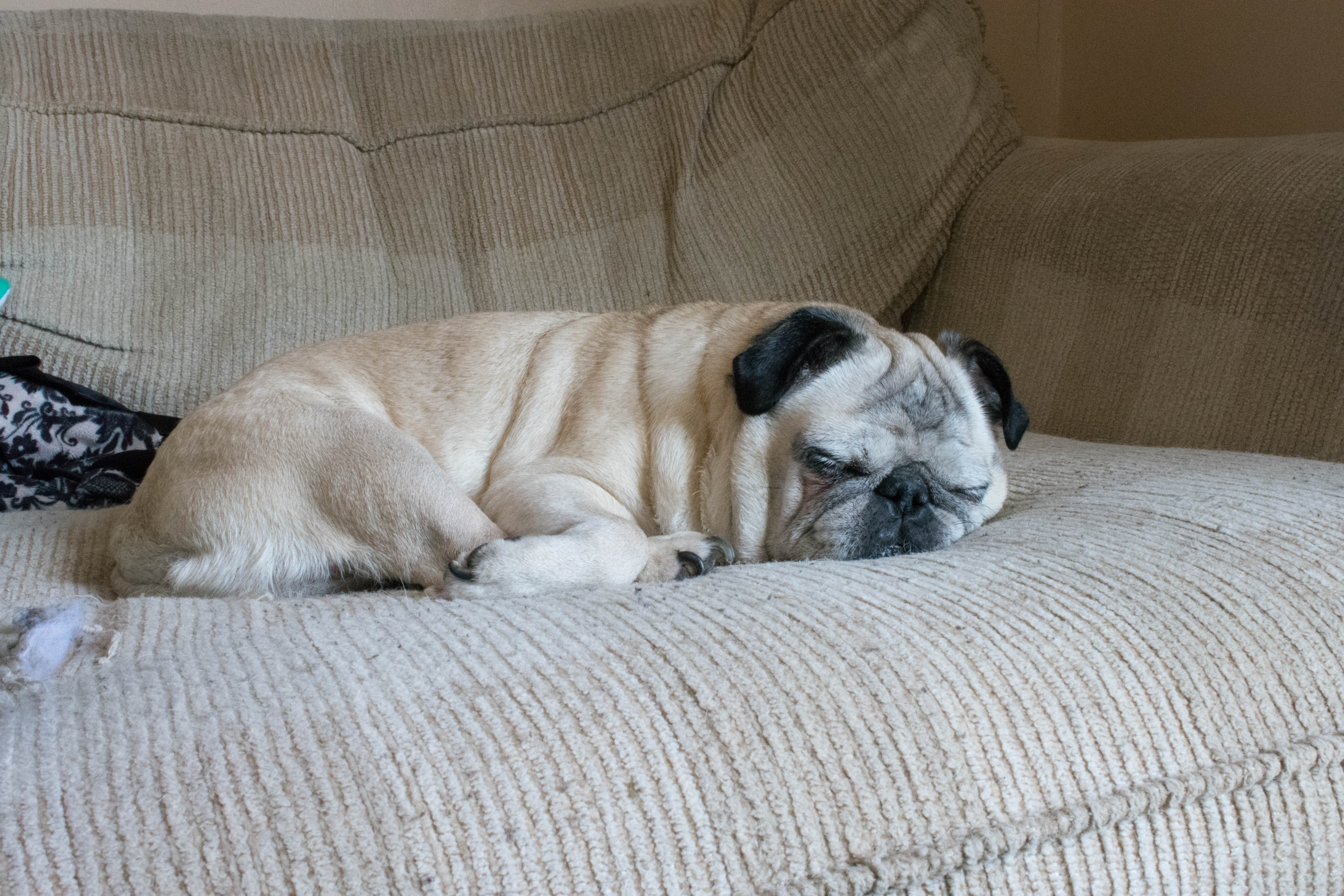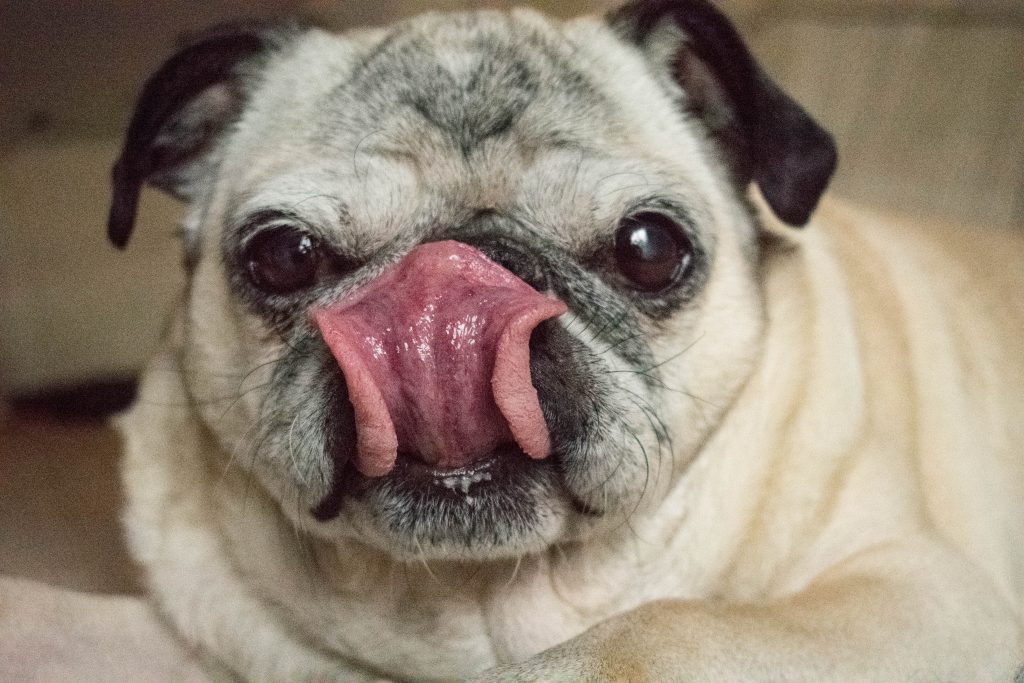
Trachea Collapse In Pugs

There is an affiliate link in this post.
Before we ever got a pug, I had read that trachea collapse is common in pugs. I knew that pugs should wear harnesses instead of collars to avoid pressure in their neck area. We’ve always used harnesses with both of our pugs.
A couple months ago, my pug Beans started choking or gagging a bit while eating her food. We had started a new type of dog food, so I thought it was just the result of the change in kibble size. We bought this slow feed bowl in size small, which forces her to slow down while eating, and was successful at preventing her choking.
Then we realized she was having coughing fits, seemingly at random. So we went to the vet. At first, they just gave us an antibiotic. It didn’t seem to help. He listened to her heart and neck, and said it sounded like the cough was starting in her neck so it was likely collapsed trachea. However, he also had us do a blood test to rule out heartworm. It came back negative, so he decided it was in fact a collapsed trachea. We were given a cough suppressant for dogs, that Beans will take for the rest of her life now.
That was about a month ago, and the medication seems to help significantly. She still coughs, but for much shorter spans of time than she was at first. We are still working on finding a balance for how often to give her medication. Some days, just one pill last her all day, and other days she starts coughing a lot in the afternoon so we give her a second. We’ve felt like there may be a connection between her coughing more when it is hotter and/or more humid, but we aren’t certain yet. However, she’s always started panting easily when it’s hot outside, so we will certainly be using the a/c very generously for her once summer hits.
We were told that in young dogs, surgery is an option but with Beans being 14 it would be very risky. So, we are just trying to keep her comfortable as much as possible. While collapsed trachea can cause discomfort, from what I have read, it usually does not reduce lifespan which is reassuring. It is more problematic in overweight pugs. I’ve always had a hard time determining if Beans is overweight, because she has a really excessive amount of skin. She feels lighter than Frank, but appears much heavier. He has a defined waist, for example, and she doesn’t. I can grab a full fistful of skin off of her back without it even making her remaining skin taught, and two handfuls off of her neck area. We’ve had some vets say she is only in need of losing 1-2 pounds, and others say she is obese which makes it hard to know who to believe. Our plan is to try her on just a bit less food at each mealtime (adding up to roughly 1/8th of a cup less per day) to try to get her down a pound or two, and then from there see if we think she needs to lose more or not. It’s funny how heavy she appears in some photos (like the tongue one above) compared to others, like the featured image where you see her whole body on the couch.
So far, things seem to be going pretty well. I wish she didn’t have this health issue, but I am thankful that treatment is available to let her stay comfortable and happy. She seems to have as much energy and happiness as she always has. Just a small bump in the road!
If you have a dog with trachea collapse feel free to share your experience, tips or advice in the comments.



Hi I adopt old pugs those one they cant be rehome for health reason. I have a 11 years old boy Leo, come to my care very sick, underweight, ear infection, cough, neck and dhoulder injury, blind, one eye ball is leaking , he hardly was able to walk. Few months later and many vet visit later Leo started getting better. He have a good appetite put on weight, nevk and shoulder healed, earinfection gone . How ever we struggle with this cough , we had antibiotics treatment over and over . Its settle a bit than we back to zero agsin. Reading your story more and more i think Leo have a same ptoblem like your pug. Also Leo cant hold his poo he not notice when he poo, just try to gind a right nappy for him, also my other pug Babushka need a nappy too now as she cant use her back legs anymore for disk related problem. She getting a wheelchair soon. So thanks all your comment it is very helpfull to hear other pug owners experience Cheers
This gives me hope. My Willoughby was just diagnosed today w/collapsed trachea. He’s getting oxygen, cough suppressants & steroids right now. I’m hoping it all helps. He’s a rescue that I got a year ago. I think he’s about 10. I love him so much & i’ve been crying all day, just so upset. Your post has given me hope. Thank you!
Sorry to hear about your Willoughby’s struggles! My Beans is still with us now, about 18 months since I originally wrote this post. Her coughing is not well maintained with medication, most mornings she wakes me up with her coughing. But it does help some. On occasion when i’ve forgotten a dose she definitely coughs more. Despite coughing a lot even with meds, she seems happy so i’m grateful for that and we will keep doing what we can to support her until she seems to be suffering but she definitely doesn’t seem to be. She’s prone to anxiety so I think if she were tense or unhappy regularly we would definitely be able to tell.
A comment about weight reduction for your little guy. Instead of cutting back on food, replace with fresh veggies: broccoli, yams, etc. Good fibre, low calories. Preferable to having him feeling hungry. One-eighth cup for a small dog is substantial. Just a thought.
Hi:
I’ve been dealing with Pepito’s collapsing trachea, chronic bronchitis and enlargement heart but the first one is the one which is giving him more trouble, he is about 11 now, he is a bkue chihuahua that I adopted back in 2012 but the cougj has been worse, we have tried everything but what most helps him are the steroids which we can’t give him to a long period of time. What are the steroids and meds you get for your doggies? Also the syrups help when os not very chronic the cough, then it just doesn’t work. Some people say warm weather is better, some says heat is bad, dry air, humidity os good ans others that is bad, I have tried the humidifier which sometimes seems to help and othera just not at all. What does it helps to your dog? I am now in Michigan where it is very cold but moving back to my country Mexico, where it can be hot and humid, what do you think is better talking about the temperature?, he hates the heat but also cold makes him very sick. I usually put the a/c very gentil when we have been in places with hot weather. I would appreciate your comments because I get very frustrated :(, thank you!
Copying a response I gave to someone else as they had basically the same question :).
Our vet had us try a prescription called temaril p which reduced the coughing but seemed to cause urinary issues (incontinence and utis – and she’s epileptic and gets seizures when she had infections) so we tried tramadol for a while but that didn’t seem to help. She had us try a small dose of benedryl which didn’t seem to help either. So she’s not being medicated for the treachea collapse/coughing anymore. The vet said it’s not painful or terminal so it sounds worse than it is. I do wish we could have found a better solution for her. I’d advise you to talk to your vet though. If our girl didn’ have epilepsy, I probably would have kept her on the temaril p as it helped significantly with the coughing and I could put her in diapers to deal with the incontinence. I just didn’t feel it was worth it for us when it was causing her to have frequent seizures. 🙁
We are in Michigan, and our dog coughs year-round but I think the heat is worse, though it’s hard to know what is just the heat vs heat and humidity as it tends to be humid when its hot here. We use A/c for the dog well before we would want to use it for ourselves. She pants and coughs if it’s above about 68 degrees. We have never been offered steroids, I had no idea they could help. Our vet made it seem like after those 3, we were out of options.
Hi I have a 16 year old pug Pearl. At night she gets agitated, pants and when she breathes there is an awful noise coming from her throat. Which cough medicine and dose did you use. She weighs about 22 pounds. She is a happy old lady, just deaf. Pugs are the sweetest dogs!
Pugs are so sweet! Our vet had us try a prescription called temaril p which reduced the coughing but seemed to cause urinary issues (incontinence and utis – and she’s epileptic and gets seizures when she had infections) so we tried tramadol for a while but that didn’t seem to help. She had us try a small dose of benedryl which didn’t seem to help either. So she’s not being medicated for the treachea collapse/coughing anymore. The vet said it’s not painful or terminal so it sounds worse than it is. I do wish we could have found a better solution for her. I’d advise you to talk to your vet though. If our girl didn’ have epilepsy, I probably would have kept her on the temaril p as it helped significantly with the coughing and I could put her in diapers to deal with the incontinence. I just didn’t feel it was worth it for us when it was causing her to have frequent seizures. 🙁
Hello Emily,
I wish my family had read your blog a few days ago. Our pug, Max, might still be alive and well today.
He died last night. Even though he would have been 17 in just 3 months, it was clear he wanted to live. Other than the breathing problem that became acute over the past week, and being nearly blind and completely deaf, he was fit and healthy, and still enjoyed his food, short walks, trips in the car, and our affection.
He struggled to breathe for a week. Early Wednesday morning we took him to our vet, who prescribed antibiotics, working from the assumption that he had bronchitis. He had also suggested an x-ray after I mentioned that my husband had matched his symptoms online to trachea collapse. But because at that point Max’s loud coughing was still intermittent, and because we’d been up late with him the night before, we decided to wait on an x-ray. I will always regret this.
Over the next two days his cough and heaving became worse, but subsided when he managed to sleep a little. When he was awake, he mostly breathed through his mouth. Because the restricted airway made it difficult, he became stressed and tried to shake it off, as he’d been able to do in the past. He persisted in trying to shake off the coughing.
He is tough, stubborn, and strong-willed. A valiant and stalwart figure, despite his diminutive stature. (I cannot yet speak of him in the past.) These traits kept him from relaxing and sleeping, which allowed him to breathe through his nose when sleep overtook him.
He seemed to feel he had to keep his guard up until the sensation passed. From Wednesday through Saturday night he fought this way. Determined to live, he literally stood his ground until finally collapsing late last night. When my daughter notice a new, strange sound in his breathing, she called out to me. He could barely walk. I wrapped him in a blanket, and as we went out the door to take him to the emergency vet, he panicked and stopped breathing. The rest is too painful to recount.
This post is a mea culpa. Max deserved better. He wanted to live, and I now that I have read your blog and know that there are treatments that could have prolonged his life, I am feeling so much sadness and regret.
I hadn’t call the vet again until Saturday morning (yesterday) to ask if they could give him a sedative. I still hadn’t done any research at that point on a collapsed trachea, although it was clear the antibiotic was ineffective and the problem seemed to be in his throat, not his lungs. The vet technicians were unable to help. There was no doctor on duty to prescribe medication, so they suggested we take him to the emergency clinic.
At around 3 pm I called the emergency clinic. They advised me to bring him in, but informed me that we could expect a wait of several hours before he would be seen. I called our vet again and asked for advice. They suggested calling a new urgent care facility that had been open for a year, one that I didn’t know about. I called this clinic and was told that they could not take any more patients–that they had reached their capacity for the day.
At that point, my husband got on line, looking for remedies. Since he is out of town, he was relying on my descriptions of Max’s symptoms, over the phone, to determine what to search for. He suggested Robitussin cough syrup.
I thought Max needed some type of sedative. I called a natural pet store and asked if they had anything of that nature. They suggested an herbal tincture with Valerian root and a ‘breathe-easy’ formula. I went there and got the bottle of the tincture and gave him half a dropper in his food when I returned home.
This narrative is too painful to continue.
We love you Max. You will remain with us in our hearts.
I hope this may serve as a cautionary tale to others to take the greatest care of those whose well-being we are responsible for.
I am so sorry to hear about your Max. That all sounds so traumatic. I’m sure he knew how loved he was. I hope you’re able to forgive yourself for just not knowing what you didn’t know.
Has anyone ever heard of a Golden Retriever with a collapsed trachea?
I’m also relieved to hear more about the collapsed trachea. My 11 year old pug has had the ‘honkng’ cough and gagging for about a year and she’s been on cough medication. Our vet also told us she would probably need the cough meds for the rest of her life BUT that a collapsed trachea is very common with pugs. She’s otherwise very loving, happy and it doesn’t seem to bother her- I think it bothers me more! Thanks so much for sharing!
We have a 14 year old Maltese, Wally. He was officially diagnosed with collapsing trachea this past summer (it is now December). The vet originally thought it was allergies because we had just self cleaned our ducts and that’s when the coughing really started (although Wally was having the occasional coughing and gagging episodes for quite a while prior to this incident). Wally was put on allergy medication. It didn’t help. Back to the vet, who took an x-ray this time. That’s when it was officially diagnosed that he had a collapsing trachea and according to the vet, it was pretty gnarly. Wally was put on prednisone and cough syrup (hydrocodone) was prescribed. At first the prednisone did wonders. We didn’t even have to use the hydrocodone. Wally hardly coughed at all. But as time went on, the prednisone had less and less effect and Wally was coughing more and more. So we had to up his prednisone again and now he has to take the hydrocodone cough syrup on a regular schedule 3-4 times a day. We also recently started him on a steroid inhaler hoping it will have a better effect than the prednisone. The plan is to stop the prednisone all together in the hopes that the steroid inhaler will do a better job of reducing the coughing. Wally still has coughing fits, but they tend to not last as long as previously. We are still up at night, usually between 1 am and 2:30 am and have to give him more cough syrup. It takes him anywhere from 10-20 minutes for the coughing to settle down. Wally seems to have his good days where he hardly coughs at all and then there are the bad days where he seems to be coughing all the time. We have found some tricks that sometimes work when his coughing is constant. Having him sit in front of the back door and letting him breath in fresh air will sometimes help break the coughing cycle. And giving him small pieces of bread or small pieces of Timbits sometimes also helps. We know that this disease will continue to progress but for now we are able to make Wally as comfortable as possible. Once we are no longer able to provide this for him and his quality of life diminishes, we will need to make the difficult decision that all fur baby parents do not want to make.
I just want to let people know that there is an excellent group on Facebook for dogs with collapsing trachea & I have learned so much by joining that group. There are actually many pharmaceutical medications that a vet can prescribe for a dog with a collapsing trachea & many many people in that group have been using these meds. The one that seems to work really well according to owners in that group is Lomotil. This is technically a digestive tract opiate for people that have chronic diarrhea but there are many studies that have shown good success with it for dogs with collapsing trachea. This Facebook group has all of the information that you would need to give your vet to read about Lomotil if they aren’t okay with prescribing it for your dog. There are several other meds for collapsing trachea too & they are all listed within the group. The Facebook group I’m referring to is called Collapsing Trachea in Small Dogs – plus Laryngeal Paralysis in Dogs.